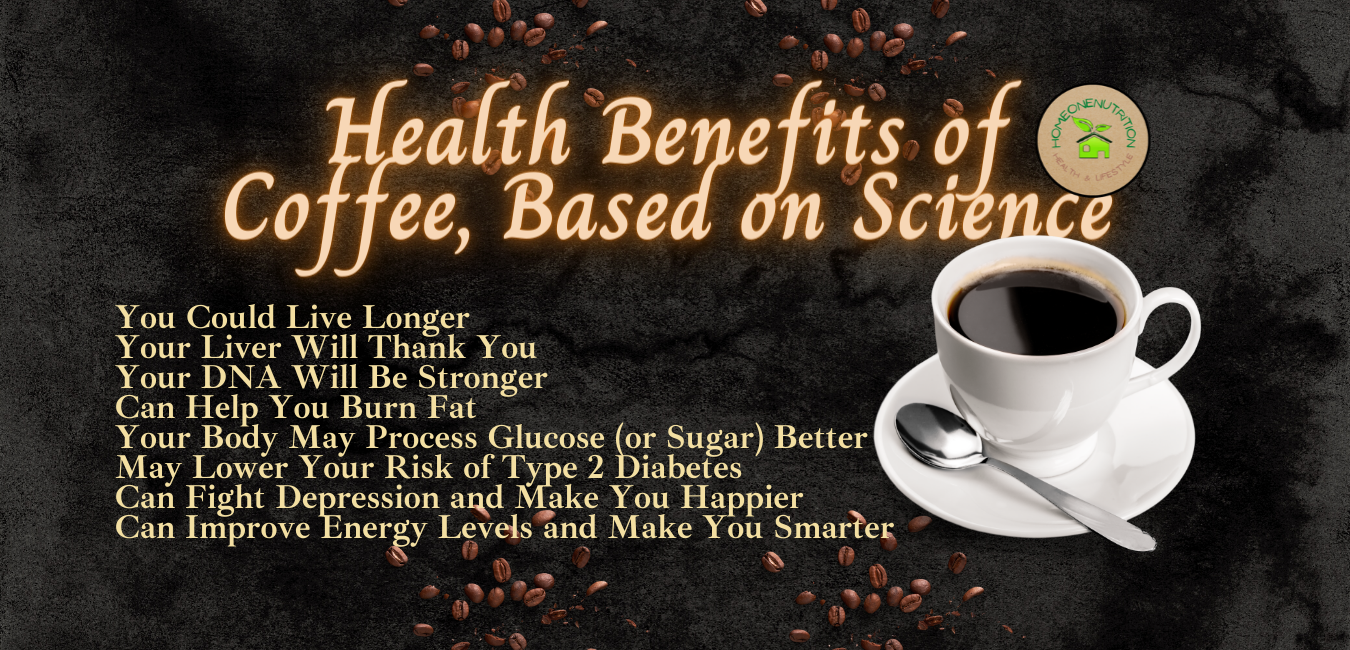Ah, coffee. Whether you’re cradling a travel mug on your way to work or dashing out after spin class to refuel with a skinny latte, it’s hard to imagine a day without it. Coffee is one of the world’s most popular beverages. Caffeine, the most widely consumed psychoactive substance in the world, is the best known ingredient of coffee.
HEALTH BENEFITS OF COFFEE
- You Could Live Longer
- Your DNA Will Be Stronger
- Your Liver Will Thank
- You Can Help You Burn Fat
- Your Body May Process Glucose (or Sugar) Better
- May Lower Your Risk of Type 2 Diabetes
- Can Fight Depression and Make You Happier
- Can Improve Energy Levels and Make You Smarter
Studies show that coffee drinkers have a much lower risk of several serious diseases.
Several studies show that caffeine can increase fat burning and boost your metabolic rate.
That’s the theory behind studies that found that people who drink more coffee are less likely to get type 2 diabetes.
Recent studies found that coffee drinkers are less likely to die from some of the leading causes of death in women: coronary heart disease, stroke, diabetes and kidney disease.
Coffee contains a number of useful nutrients, including riboflavin (vitamin B-2), niacin (vitamin B-3), magnesium, potassium, and various phenolic compounds, or antioxidants. Some experts suggest that these and other ingredients in coffee can benefit the human body in various ways.
This article tells you everything you need to know about COFFEE
Regular black coffee (without milk or cream) is low in calories. In fact, a typical cup of black coffee only contains around 2 calories. However, adding cream or sugar will increase the calorific value.
Drinking one to two cups of coffee a day may help ward off heart failure, when a weakened heart has difficulty pumping enough blood to the body.
Coffee drinkers have a much lower risk of getting Alzheimer’s disease, which is a leading cause of dementia worldwide.
Coffee drinkers have up to a 60% lower risk of getting Parkinson’s disease, the second most common neurodegenerative disorder.
Coffee appears to lower your risk of developing depression and may dramatically reduce suicide risk.
Caffeine can increase adrenaline levels and release fatty acids from your fat tissues. It also leads to significant improvements in physical performance.
Caffeine blocks an inhibitory neurotransmitter in your brain, which causes a stimulant effect. This improves energy levels, mood and various aspects of brain function.
If you enjoy its taste and tolerate its caffeine content, don’t hesitate to pour yourself a cup or more throughout the day.
Risks and Precautions
However, high doses of Caffeine may have unpleasant and even dangerous side effects. A person who weighs about 60kg should drink no more than 1.5 cups of coffee or 3 cans of cola per day. For people who already have heart problems or anxiety disorders, large amounts of caffeine may make these problems worse. Although there is no uniformly recognized safe level of caffeine consumption, for healthy adults a moderate intake of 400mg per day (equivalent to about 4 cups of coffee) is generally considered safe.
Always remember to stay within the limit.
It is best to drink it in moderation and as part of a varied, balanced diet.
"All information provided within this web and mobile application is intended for general information and is provided on the understanding that no surgical and medical advice or recommendation is being rendered. Please do not disregard the professional advice of your physician."





